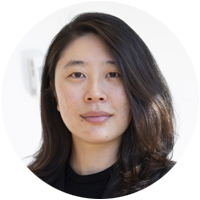Victoria Choi, PhD | Effective Writing for Health Care

Victoria Choi, PhD is a research fellow and senior acupuncturist at the Chris O’Brien Lifehouse cancer hospital in Australia. In 2020, she had recently completed her Ph.D. on the mechanistic effects of acupuncture and was busy using the techniques to help with cancer patients' symptoms. "I noticed that I was seeing quite a lot of chemotherapy-induced peripheral neuropathy (CIPN). That informed my research trajectory because I was looking to use my acupuncture knowledge and apply it in the integrative oncology setting," she says.
Effective Writing and the Path to an Acupuncture Pilot Study
CIPN is a disease that can cause damage to peripheral nerves as people undergo cancer treatment. It manifests most commonly as numbness and tingling in hands and feet and can last months and years after initial treatment. Because acupuncture as a clinical intervention for CIPN is not as well-established in Australia, Choi resolved to begin a pilot study, the first to assess the effects of acupuncture on cancer patients in Australia.
She began looking for grants to apply to. Then, her supervisor came across the Effective Writing for Health Care program at Harvard Medical School (HMS). The program's grant track was exactly what she needed, she says: "I'd never had a dedicated writing course, and I thought it'd be nice to get a good overview of the fundamentals. I wanted to upgrade my skills as a writer." Thus far, her experience has already paid off in spades.
Learning How to Write a Grant, While Drafting a Real Grant
Choi applied for the program in 2020 and began coursework in early 2021—remotely due to the pandemic. The timing was auspicious: she was pulling together her grant in March and April 2021 while simultaneously doing a literature review with Effective Writing. As the program was focusing on the nitty-gritty of grant writing, she was refining her grant application for submission. In June, while she was working on her capstone project, she got the news that the grant had been approved.
Being in the course gave her the confidence to pursue her research fully and approach potential collaborators without hesitation. "Because I became more comfortable with communicating my work to colleagues at the hospital, I started to receive more support for my ideas," she remembers. For her capstone project, Choi edited and enhanced her completed grant. That way, the next time she must submit for future studies, she has most of the content ready to go. There has already been discussion about making her pilot study larger, so this completed writing project will be relevant to her long-term career.
On a broader level, she's found the program useful for communicating what she does with acupuncture—which can still be an area that clinicians are less familiar with (and less trusting of as a result). Choi regularly gets a lot of questions around her research, some of them very rudimentary, but mostly the experts come from a place of curiosity, she says. So, learning to convey her expertise clearly through Effective Writing has been essential.
"I'm more interested in having an open dialogue because it helps get rid of uncertainties. And it gives a safe space for people to ask these questions so that they know more about it, which is the whole point," she says.
Enhancing Professional Writing and Communication Beyond Grant-Writing
In addition to her focus on mastering grammar and style, Choi saw Effective Writing as an opportunity to experiment with her writing since the faculty gave her honest, productive feedback. When she completed her capstone, "I felt for the first time, 'Yes, I'm very happy with this writing,'" she says. "In my past experiences, my work was functional. I got the point across; I've said what I've had to say. But writing is a part of me, and I want to love my work so that I can share it. My approach and feelings about writing have changed, thanks to the course."
She also developed her skills in argumentative writing, which (as the underlying style for a lot of scientific writing) will apply to many of her future articles and papers. During Effective Writing, she happened to be writing a protocol paper for her clinical position at the same time, which meant she was able to test out the new format—and get feedback—in real time.
She does peer review for several journals as well as teaches undergraduate students in anatomy and physiology, which are roles where she is required to give feedback. Now, when she gives them comments on their work, "I remember the Harvard faculty giving us feedback. The way they structured it was very constructive and non-judgmental. I can model that for my students and other authors—this is what an academic should be doing."
Post-Effective Writing, Applying the Same Strategy to Research
Choi graduated from Effective Writing in 2021. Now, she's a student in the HMS Global Clinical Scholars Research Training (GCSRT) program, scheduled to graduate in 2023. Her clinical trial is running concurrently—she's currently recruiting participants and is now in the intervention phase of her trial. She found, in writing up her ethics application, that her biggest concern was learning how to run a clinical trial in a hospital setting very quickly, making sure she is following the Good Clinical Practice (GCP) guidelines for a safe and ethical trial. So, she decided that attending GCSRT was the logical next step in her journey.
She's following the same basic strategy as the one she employed in Effective Writing: completing research while doing coursework related to it. "GCSRT is clinical research with a heavy focus on study design, but it also covers the elements involved in conducting a good clinical trial. It was a bit of a no-brainer, really," she says.
Learn more about Effective Writing for Health Care.
Written by Katherine J. Igoe